图说英语-英语单词的前缀词根和后缀(25页PPT)
文档属性
| 名称 | 图说英语-英语单词的前缀词根和后缀(25页PPT) |

|
|
| 格式 | zip | ||
| 文件大小 | 325.4KB | ||
| 资源类型 | 教案 | ||
| 版本资源 | 通用版 | ||
| 科目 | 英语 | ||
| 更新时间 | 2022-10-24 00:00:00 | ||
图片预览


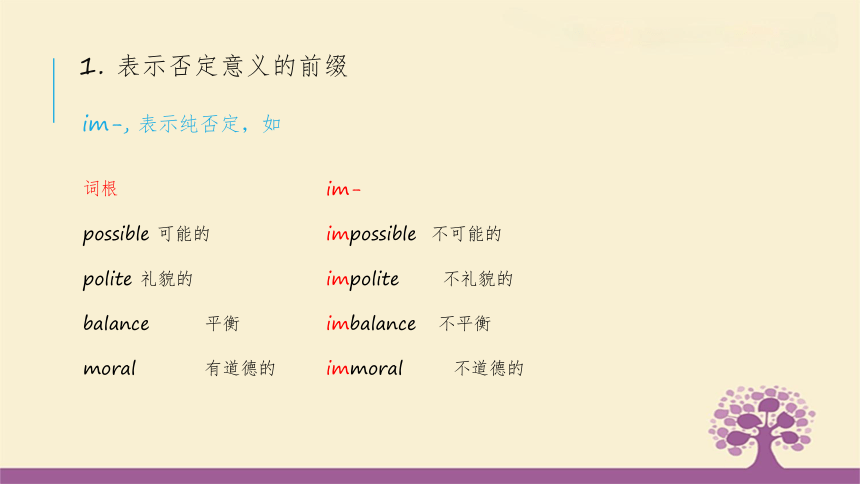

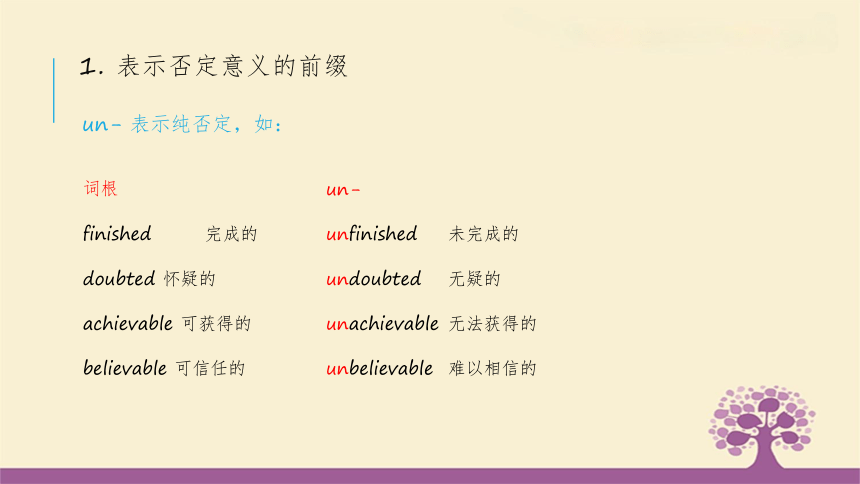
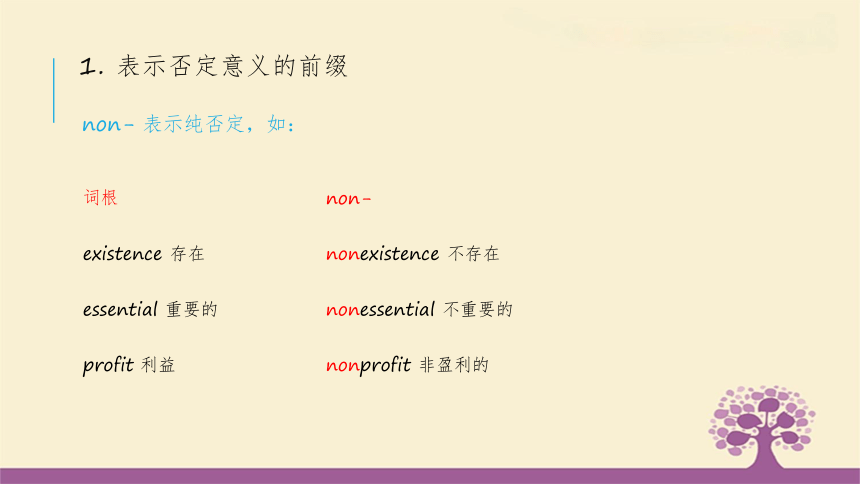
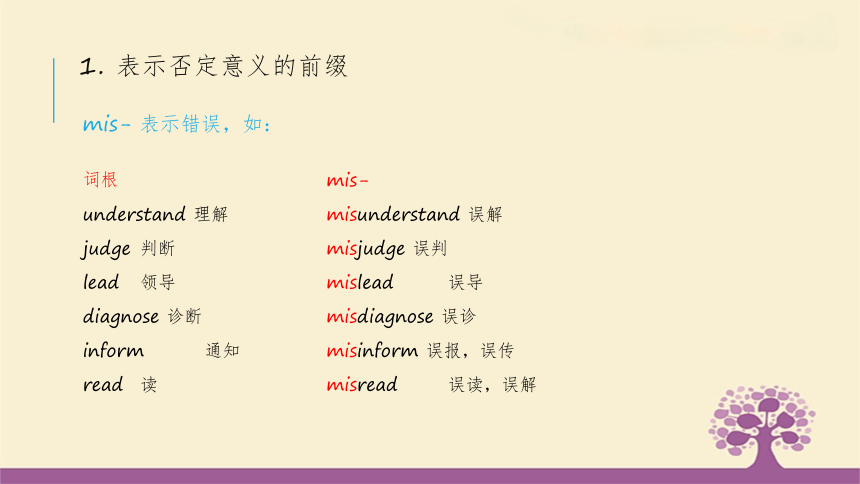
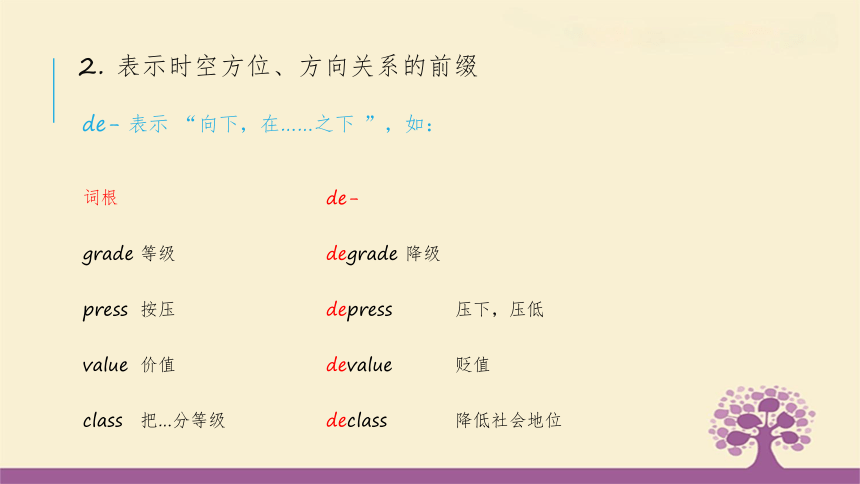
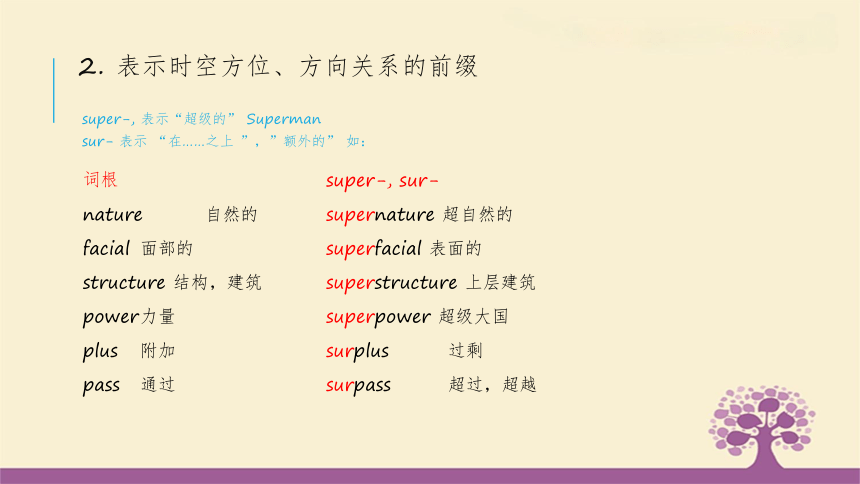
文档简介
(共25张PPT)
轻轻松松记单词
英语单词的 前缀 词根 后缀
1. 表示否定意义的前缀
dis- 表示纯否定,如:
词根
Like 喜欢
advantage 优点
appear 出现
agree 同意
honest 诚实的
approve 支持
able 能够
dis-
Dislike 不喜欢
disadvantage 缺点
disappear 消失
disagree 不同意
dishonest 不诚实的
disapprove 反对
disable 使丧失能力
1. 表示否定意义的前缀
im-, 表示纯否定,如
词根
possible 可能的
polite 礼貌的
balance 平衡
moral 有道德的
im-
impossible 不可能的
impolite 不礼貌的
imbalance 不平衡
immoral 不道德的
1. 表示否定意义的前缀
in-, 表示纯否定,如:
词根
correct 正确的
ability 能力
active 活跃的
capable 有能力的
in-
incorrect 不正确的
inability 无能力,无才能
inactive 不活跃的
incapable 没有能力的
1. 表示否定意义的前缀
un- 表示纯否定,如:
词根
finished 完成的
doubted 怀疑的
achievable 可获得的
believable 可信任的
un-
unfinished 未完成的
undoubted 无疑的
unachievable 无法获得的
unbelievable 难以相信的
1. 表示否定意义的前缀
non- 表示纯否定,如:
词根
existence 存在
essential 重要的
profit 利益
non-
nonexistence 不存在
nonessential 不重要的
nonprofit 非盈利的
1. 表示否定意义的前缀
mis- 表示错误,如:
词根
understand 理解
judge 判断
lead 领导
diagnose 诊断
inform 通知
read 读
mis-
misunderstand 误解
misjudge 误判
mislead 误导
misdiagnose 误诊
misinform 误报,误传
misread 误读,误解
2. 表示时空方位、方向关系的前缀
de- 表示 “向下,在……之下 ”,如:
词根
grade 等级
press 按压
value 价值
class 把…分等级
de-
degrade 降级
depress 压下,压低
devalue 贬值
declass 降低社会地位
2. 表示时空方位、方向关系的前缀
super-, 表示“超级的” Superman
sur- 表示 “在……之上 ”,”额外的” 如:
词根
nature 自然的
facial 面部的
structure 结构,建筑
power 力量
plus 附加
pass 通过
super-, sur-
supernature 超自然的
superfacial 表面的
superstructure 上层建筑
superpower 超级大国
surplus 过剩
surpass 超过,超越
3.表示时间、序列、顺序、关系的前缀
mid- 表示 “中,中间 ”,如:
词根
night 夜晚
summer 夏天
day 白天
field 战场,领域
point 点
mid-
midnight 午夜,深夜
midsummer 仲夏
midday 中午,正午
midfield 中场
midpoint 正中央,中点
3.表示时间、序列、顺序、关系的前缀
post- 表示 “在……后,后 ”,如:
词根
war 战争
position 位置
script 脚本,手迹
date 日期
post-
postwar 战后
postposition 后置成分
postscript 附言
postdate 推迟日期
3.表示时间、序列、顺序、关系的前缀
re- 表示 “重新、再、又 ”,如:
词根
view 观察
turn 转动
write 写
build 建造
place 放置
birth 出生
re-
review 回顾,复习
return 返回
rewrite 重写
rebuild 重建
replace 更换
rebirth 重生
3.表示时间、序列、顺序、关系的前缀
inter- 表示 “相互,交互,在一起 ”,如:
词根
view 观察,考虑
national 国家的
net 网络
inter-
interview 面试,采访
international 国际的
internet 互联网
4.常见名词后缀
-or, -er 表示 “从事某种职业的人 ”,如:teacher, worker
词根
direct 管理,指挥
engine 引擎,发动机
drive 驾驶
report 报告
hold 持有
-or, -er
director 导演
engineer 工程师
driver 司机
reporter 记者
holder 持有者
4.常见名词后缀
-hood 表示 “时期 ”,如:
词根
child 孩子
man 人(类)
-hood
childhood 童年时期
manhood 成年期
4.常见名词后缀
-ess, -ress 表示 “女性 ”,如:
词根
host 主持
act 表演
emperor 皇帝
-ess, -ress
hostess 女主人
actress 女演员
emperess 女皇帝
4.常见名词后缀
-ese 表示 “民族,语言 ”,如:
词根
China 中国
Japan 日本
-ese
Chinese 中国人,汉语
Japanese 日本,日语
4.常见名词后缀
-tion 表示 “动作,状态 ”,如:
词根
invite 邀请
attract 吸引
pronounce 发音
-tion
invitation 邀请
attraction 吸引力
pronunciation 发音,读音
5.常见动词后缀
-ify, -en, -ize 表示 “使……化 ”,如:
词根
simple 简单的
diverse 多种多样的
wide 宽的
high 高的
legal 合法的
-ify, -en, -ize
simplify 使简化
diversify 使多样化
widen 变宽
heighten 增高
legalize 使合法化
6.常见形容词后缀
-less 表示 “没有,无 ”,如:
词根
meaning 意义
hope 希望
care 关心
aim 目的,目标
ground 地面
fear 害怕
-less
meaningless 无意义的
hopeless 绝望的
careless 粗心的
aimless 漫无目的的
groundless 无根据的
fearless 无畏的
6.常见形容词后缀
-able, -ble 表示 “可以……的 ”,如:
词根
read 阅读
change 改变
compare 比较
deceive 欺骗
do 进行
sense 感觉
-able, -ble
readable 可读的
changeable 可改变的
comparable 比得上的
deceivable 易受骗的
doable 可行的
sensible 可察觉的
6.常见形容词后缀
-al 表示 “……属性的,……类型的 ”
名词 + al -> 形容词,如:
词根
person 人
culture 文化
region 地区
music 音乐
eletricity 电
economy 经济
-al
personal 个人的
cultural 文化的
regional 地区的
musical 音乐的
electrical 有关电的
economical 节约的
6.常见形容词后缀
-y 表示 “性质 ”
名词 + y -> 形容词,如:
词根
fun 乐趣
health 健康
cloud 云
wind 风
-y
funny 有趣的
healthy 健康的
cloudy 多云的
windy 有风的
6.常见形容词后缀
-ing 表示 “物的性质 ”,如:interesting 有趣的
-ed 表示 “人的感受 ”,如:interested 对……感兴趣
词根
excite 兴奋
bore 使烦恼
surprise 惊奇
relax 放松
amaze 使吃惊
-ing, -ed
exciting 令人兴奋的 excited感到兴奋的
boring 令人烦恼的 bored 感到无聊的
surprising 令人吃惊的 surprised感到吃惊的
Relaxing令人放松的 relaxed感到放松的
amazing 令人惊奇的 amazed感到惊奇的
7.常见副词后缀
-ly 表示 “以……方式 ”,如:
词根
happy 开心的
strange 陌生的
quick 快速的
slow 慢的
rough 粗糙的
absolute 完全的
-ly
happlily 高兴地
strangely 不可思议地
quickly 迅速地
slowly 慢慢地
roughly 粗略地
absolutely 绝对地
形容词+ ly -> 副词
形容词: 修饰名词
副 词:修饰动词 (后置)和形容词
轻轻松松记单词
英语单词的 前缀 词根 后缀
1. 表示否定意义的前缀
dis- 表示纯否定,如:
词根
Like 喜欢
advantage 优点
appear 出现
agree 同意
honest 诚实的
approve 支持
able 能够
dis-
Dislike 不喜欢
disadvantage 缺点
disappear 消失
disagree 不同意
dishonest 不诚实的
disapprove 反对
disable 使丧失能力
1. 表示否定意义的前缀
im-, 表示纯否定,如
词根
possible 可能的
polite 礼貌的
balance 平衡
moral 有道德的
im-
impossible 不可能的
impolite 不礼貌的
imbalance 不平衡
immoral 不道德的
1. 表示否定意义的前缀
in-, 表示纯否定,如:
词根
correct 正确的
ability 能力
active 活跃的
capable 有能力的
in-
incorrect 不正确的
inability 无能力,无才能
inactive 不活跃的
incapable 没有能力的
1. 表示否定意义的前缀
un- 表示纯否定,如:
词根
finished 完成的
doubted 怀疑的
achievable 可获得的
believable 可信任的
un-
unfinished 未完成的
undoubted 无疑的
unachievable 无法获得的
unbelievable 难以相信的
1. 表示否定意义的前缀
non- 表示纯否定,如:
词根
existence 存在
essential 重要的
profit 利益
non-
nonexistence 不存在
nonessential 不重要的
nonprofit 非盈利的
1. 表示否定意义的前缀
mis- 表示错误,如:
词根
understand 理解
judge 判断
lead 领导
diagnose 诊断
inform 通知
read 读
mis-
misunderstand 误解
misjudge 误判
mislead 误导
misdiagnose 误诊
misinform 误报,误传
misread 误读,误解
2. 表示时空方位、方向关系的前缀
de- 表示 “向下,在……之下 ”,如:
词根
grade 等级
press 按压
value 价值
class 把…分等级
de-
degrade 降级
depress 压下,压低
devalue 贬值
declass 降低社会地位
2. 表示时空方位、方向关系的前缀
super-, 表示“超级的” Superman
sur- 表示 “在……之上 ”,”额外的” 如:
词根
nature 自然的
facial 面部的
structure 结构,建筑
power 力量
plus 附加
pass 通过
super-, sur-
supernature 超自然的
superfacial 表面的
superstructure 上层建筑
superpower 超级大国
surplus 过剩
surpass 超过,超越
3.表示时间、序列、顺序、关系的前缀
mid- 表示 “中,中间 ”,如:
词根
night 夜晚
summer 夏天
day 白天
field 战场,领域
point 点
mid-
midnight 午夜,深夜
midsummer 仲夏
midday 中午,正午
midfield 中场
midpoint 正中央,中点
3.表示时间、序列、顺序、关系的前缀
post- 表示 “在……后,后 ”,如:
词根
war 战争
position 位置
script 脚本,手迹
date 日期
post-
postwar 战后
postposition 后置成分
postscript 附言
postdate 推迟日期
3.表示时间、序列、顺序、关系的前缀
re- 表示 “重新、再、又 ”,如:
词根
view 观察
turn 转动
write 写
build 建造
place 放置
birth 出生
re-
review 回顾,复习
return 返回
rewrite 重写
rebuild 重建
replace 更换
rebirth 重生
3.表示时间、序列、顺序、关系的前缀
inter- 表示 “相互,交互,在一起 ”,如:
词根
view 观察,考虑
national 国家的
net 网络
inter-
interview 面试,采访
international 国际的
internet 互联网
4.常见名词后缀
-or, -er 表示 “从事某种职业的人 ”,如:teacher, worker
词根
direct 管理,指挥
engine 引擎,发动机
drive 驾驶
report 报告
hold 持有
-or, -er
director 导演
engineer 工程师
driver 司机
reporter 记者
holder 持有者
4.常见名词后缀
-hood 表示 “时期 ”,如:
词根
child 孩子
man 人(类)
-hood
childhood 童年时期
manhood 成年期
4.常见名词后缀
-ess, -ress 表示 “女性 ”,如:
词根
host 主持
act 表演
emperor 皇帝
-ess, -ress
hostess 女主人
actress 女演员
emperess 女皇帝
4.常见名词后缀
-ese 表示 “民族,语言 ”,如:
词根
China 中国
Japan 日本
-ese
Chinese 中国人,汉语
Japanese 日本,日语
4.常见名词后缀
-tion 表示 “动作,状态 ”,如:
词根
invite 邀请
attract 吸引
pronounce 发音
-tion
invitation 邀请
attraction 吸引力
pronunciation 发音,读音
5.常见动词后缀
-ify, -en, -ize 表示 “使……化 ”,如:
词根
simple 简单的
diverse 多种多样的
wide 宽的
high 高的
legal 合法的
-ify, -en, -ize
simplify 使简化
diversify 使多样化
widen 变宽
heighten 增高
legalize 使合法化
6.常见形容词后缀
-less 表示 “没有,无 ”,如:
词根
meaning 意义
hope 希望
care 关心
aim 目的,目标
ground 地面
fear 害怕
-less
meaningless 无意义的
hopeless 绝望的
careless 粗心的
aimless 漫无目的的
groundless 无根据的
fearless 无畏的
6.常见形容词后缀
-able, -ble 表示 “可以……的 ”,如:
词根
read 阅读
change 改变
compare 比较
deceive 欺骗
do 进行
sense 感觉
-able, -ble
readable 可读的
changeable 可改变的
comparable 比得上的
deceivable 易受骗的
doable 可行的
sensible 可察觉的
6.常见形容词后缀
-al 表示 “……属性的,……类型的 ”
名词 + al -> 形容词,如:
词根
person 人
culture 文化
region 地区
music 音乐
eletricity 电
economy 经济
-al
personal 个人的
cultural 文化的
regional 地区的
musical 音乐的
electrical 有关电的
economical 节约的
6.常见形容词后缀
-y 表示 “性质 ”
名词 + y -> 形容词,如:
词根
fun 乐趣
health 健康
cloud 云
wind 风
-y
funny 有趣的
healthy 健康的
cloudy 多云的
windy 有风的
6.常见形容词后缀
-ing 表示 “物的性质 ”,如:interesting 有趣的
-ed 表示 “人的感受 ”,如:interested 对……感兴趣
词根
excite 兴奋
bore 使烦恼
surprise 惊奇
relax 放松
amaze 使吃惊
-ing, -ed
exciting 令人兴奋的 excited感到兴奋的
boring 令人烦恼的 bored 感到无聊的
surprising 令人吃惊的 surprised感到吃惊的
Relaxing令人放松的 relaxed感到放松的
amazing 令人惊奇的 amazed感到惊奇的
7.常见副词后缀
-ly 表示 “以……方式 ”,如:
词根
happy 开心的
strange 陌生的
quick 快速的
slow 慢的
rough 粗糙的
absolute 完全的
-ly
happlily 高兴地
strangely 不可思议地
quickly 迅速地
slowly 慢慢地
roughly 粗略地
absolutely 绝对地
形容词+ ly -> 副词
形容词: 修饰名词
副 词:修饰动词 (后置)和形容词
